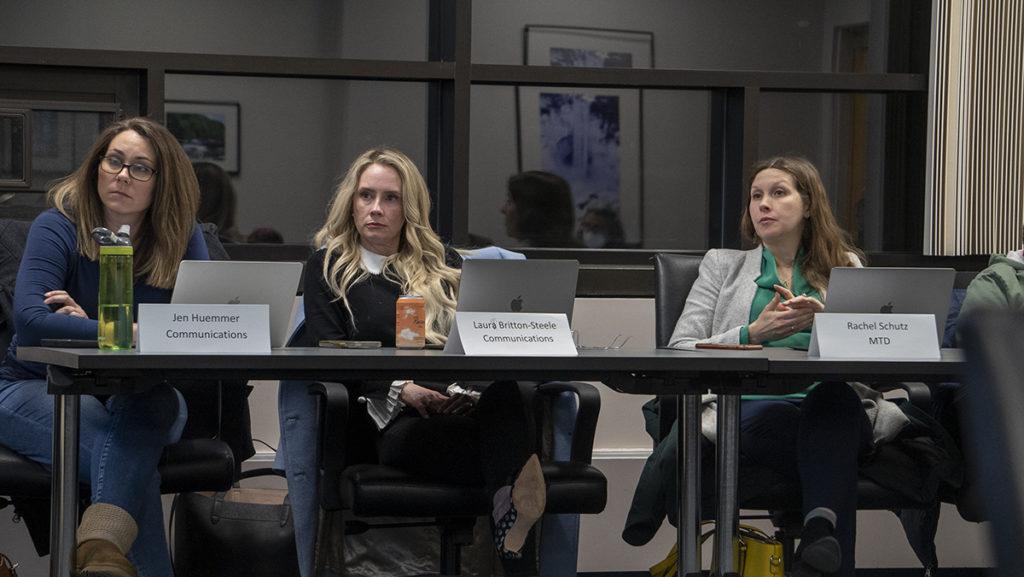The Feb. 7 Faculty Council meeting covered heavy topics, including trust issues between Ithaca College faculty and administration, shared governance responsibilities and a controversial Title IX report.
Ellen Staurowsky, professor in the Department of Media Arts, Sciences and Studies, is no longer chair of the council but remains a member-at-large. Charis Dimaras, professor in the Department of Music Performance and former vice-chair of the council, is the new chair.
The meeting started with a closed executive session for council elections.
Melanie Stein, provost and vice president of academic affairs, started the open session with the Provost’s Report. At the last meeting Dec. 7, Stein said she would not stay at council meetings after giving the Provost’s Report. However, at the Feb. 7 meeting, she remained in the room for the duration of the council meeting and participated in discussions.
As part of her report, Stein shared updates about curriculum changes. She said that in January, nine new programs were passed through the Academic Policies Committee, which is responsible for improving curriculum at the college. One of the proposed curriculum changes would transition more three-credit classes into four credits.
Stein then focused on shared governance and on addressing the issues of trust between faculty and administration, as discussed at the last faculty council meeting. She said part of that discussion also included the significant instability in leadership.
Stein said she met with the Student Governance Council and the executive committee of the Staff Council to discuss the issues of trust. She said she also has convened a small steering committee to address the issues.
“The end goal is creating a campus shared governance value statement that describes the division of responsibilities,” Stein said.
Jen Huemmer, assistant professor in the Department of Strategic Communication, said the council and faculty need to consider their goals for communication.
“Communication for the sake of communication can become very emotional, very hyperbolic, and spin us around in circles,” Huemmer said. “One of the things that we always have our students think about when they’re crafting strategic communication is, ‘What is the goal of this communication?’”
Belisa Gonzalez, professor in the Department of Sociology and director of the Center for the Study of Culture, Race, and Ethnicity, said part of the problem with communicating is the separation between departments and schools and the separation between faculty and administration.
“What I … suggest is that we show up for each other,” Gonzalez said. “It’s meaningful when I see other faculty, certainly students and administrators, show up at events that people have worked really hard to put on.”
Huemmer said one of the barriers to addressing the trust issues is how the issues get framed as unilateral, where faculty do not trust the administration.
“We have these more complicated conversations, this continued presentation of [trust issues], which I’m honestly not 100% convinced is as widespread as our continued prioritization of it would imply,” Huemmer said.
After tabling the discussion, Dimaras brought up a report conducted by the college’s Title IX team in the Office of Student Conduct and Community Standards, led by Linda Koenig, director of Title IX Compliance, in May 2021. The report surveyed 21 faculty in the then-School of Music — now the Center for Music within the School of Music, Theatre, and Dance. Dimaras said he was told that ultimately all schools would get similar reports, but the then-School of Music was the first.
Dimaras said he received the results of the report at a Feb. 1 meeting with the faculty in his school after asking for it over a year ago. He said the presentation highlighted three main themes that contributed to tension among faculty: the power differential between tenured and non-tenured faculty, race and gender and the working environment.
Dimaras said the report itself, which he received later that day, had a different tone from the presentation.
[The report was] rather accusatory, rather aggressive, and, in my opinion, had nothing to do with what was presented [at the meeting],” Dimaras said.
Stein said the provost’s office at the time asked for the survey to be conducted, although she had no direct involvement until after the survey had ended. She said that the goal of the survey was to provide a confidential safe space for faculty to share their concerns on the school’s climate and that the presentation accurately reflected the tensions that the surveyed faculty brought up.
Stein said Koenig attempted to share the results of the report with the then-School of Music but was not well-received, and that was when Stein got involved in the report.
“[Koenig] came to me and said, ‘I tried to go back to the [School of Music] and I was told I couldn’t talk to the school until I had talked to some leadership committee,’” Stein said. “She says she was greeted with such resistance that, in the meeting, she was unable to get to the themes.”
Vadim Serebryany, associate professor in the Department of Music Performance, said he was in the leadership committee meeting that Stein was referring to and said the decision to not continue with the surveys was the correct one.
“[The report] very specifically singles out white male faculty, in particular tenured white male faculty, as being the root of the problem,” Serebryany said. “My constituents have said that it feels to them that there’s a targeted message here, speaking of issues of trust. This, to them, feels like a major betrayal in that regard. A couple of them have expressed to me that they are seriously considering speeding up their retirement as a result of this [report].”
Stein said that after the Feb. 1 meeting, the faculty asked to see the report, and after checking with Koenig and the college’s legal team, it was determined that the report could be shared.
“There was a request from the faculty to see the report,” Stein said. “We all said it’s fine [that] we share the report. There’s no identifying information in the report.”
When asked after the council meeting, Stein declined to share the report with The Ithacan.
Stein said the report, although initially intended to be conducted throughout all the schools in the college, will not continue because of understaffing issues and said nobody has the capacity to continue with the survey.
Gonzalez said if a climate survey was being conducted in her school, she would view it as a positive step toward dismantling the systemic issues of oppression on which higher education is built. She asked to see the report, and Dimaras responded that she could and that it is public.
Gonzalez said she recommends bringing in an outside perspective to discuss the climate survey and its results and said she could look at it and help interpret what it means.
“To receive this information in this format, it seems very pointed in the direction of dismissing the experiences of the minoritized faculty in the then-School of Music,” Gonzalez said. “I can’t — I don’t accept that.”









